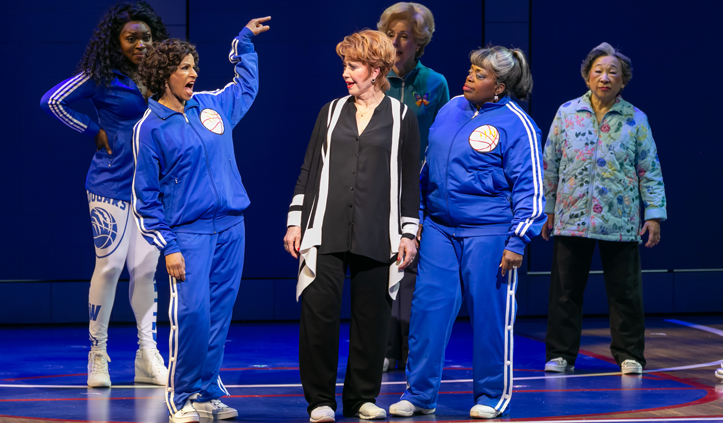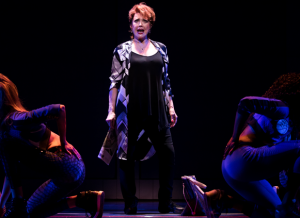
Half Time. Paper Mill Playhouse, June 2018.
The idea for this new musical seemed promising. New Jersey’s pro basketball team recruits old people to stage a halftime dance routine. The team’s marketing department thinks it will be amusing, but the seniors take things quite seriously.
I can relate. When my son was in the University of Pittsburgh marching band, I — and other fathers — were recruited to learn a halftime dance production and perform it on the field at Heinz Stadium.
Half Time at Paper Mill Playhouse, directed by Jerry Mitchell, reveals two other aspects that raise the show to a higher level than merely clever and cute. One is its humanizing of each of the dancers, and the other is a disclosure of an unexpected link between hip-hop music and senior citizens.
When these oldsters are told they must dance hip-hop, they’re disdainful. (By the way, there’s nothing wrong about calling these people “old.” It’s a compliment.) But their instructor points out that hip-hop was invented as a rebellion by a segment of society that felt unappreciated and shunned — just like these seniors. They used hip hop to say, “I’m dangerous. I’m sexy. I’m talented. You must pay attention to me.”
Half Time began performances May 31 for a limited engagement through Sunday, July 1, 2018. The cast features Georgia Engel (The Drowsy Chaperone), Lillias White (The Life), André De Shields (The Wiz, The Full Monty) and Donna McKechnie (A Chorus Line) who tell a true story of New Jersey seniors with big dreams. Most of the music and all of the arrangements are by Matthew Sklar (The Wedding Singer) who began his professional career as a rehearsal pianist at Paper Mill Playhouse. The book is by Bob Martin (The Drowsy Chaperone) and Chad Beguelin (Aladdin) and lyrics are by Nell Benjamin (Legally Blonde).
Interesting parallels exist between this show and A Chorus Line. Both center on dancers competing for inclusion in a production; both deal with ageism, and contain back stories about each dancer; and both have music by Marvin Hamlisch. He was the original composer as work started on Half Time in 2010. He wrote seven songs prior to his death in 2012, two of which remain in the show: “Dorothy/Dottie” which is Engel’s big number, and “The Prince of Swing/There You Are” where De Shields reminisces about his late wife. That two-part song has an insinuating swing beat and segues into haunting sweetness.
Sklar was a Hamlisch protegee who was working with him on the show at its beginning. His own song about aging (“The Waters Rise. Time is coming to take everything you love.”) would make his mentor proud.
A further link is McKechnie’s song, “Too Good for This,” decidedly reminiscent of “The Music and the Mirror” which Hamlisch wrote for her in A Chorus Line. Hamlisch-like chords accompany McKechnie as she spins in front of a large mirror. Naturally, the audience erupts with nostalgic enthusiasm. Way back in 1975 McKechnie played a once-successful dancer whom the director felt was too old for inclusion. Now, 43 years later, McKechnie’s presence epitomizes the theme of Half Time.
Each of the oldtimers battle stereotypes and self-doubt. One is legally blind. One has a husband with Alzheimers. Engel needs a cane. They all want to get out there and be seen, but on their own terms. They feel bullied by a corporate vice president Alison (Tracy Jai Edwards) and the coach Tara (Haven Burton) who was the basketball team’s lead dancer until she “aged out” when she turned 27.
Half Time has merit even without familiar names, but when the cast is headed, as it is here, with famed stars, it’s a potential blockbuster. Engel is surprisingly excellent as a kindergarten teacher who has an instinct for Dre and Jay-Z. White has grey hair and a few extra inches but sounds as powerful as ever. De Shields is elegantly seductive at 73. And McKechnie is beautiful and graceful at age 75.
Great solos put spotlights on each of them, and on Nancy Ticotin as a high kicker with a lover who’s less than half her age, and Lori Tan Chinn as an adorable Asian-American. Nkeki Obi-Melekwe is a standout as White’s granddaughter who is having an affair with a married basketball player. Special commendation is due Haven Burton because her character is threatened from two sides and she excels in the song, “Who Wants to See That?”
Impressive sets are by David Rockwell with costumes by Gregg Barnes. Jerry Mitchell’s direction is quickly-shifting and his choreography is cleverly inventive.
This show is based on a documentary film by Dori Berinstein, Gotta Dance. A message that sticks with us is the complaint from one of the ladies in Half Time, “I’m barely there to you ‘cause my hair’s a little grey. I walk a little slow, but don’t push me out of the way. I’m not here to sit on the couch. Not here to watch my kids’ kid.”
Below, McKechnie:
